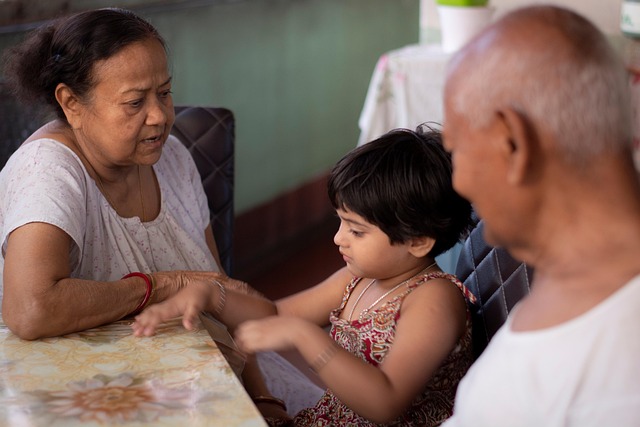In Oregon, understanding advocacy is crucial for grandparents aiming to actively participate in their grandchildren's lives. The state has a robust legal framework protecting grandparent rights, allowing them to pursue parental time or visitation through courts deciding based on the child's best interests. Navigating family court procedures requires knowledge of local rules and guidance from experienced legal professionals. Building a strong case involves documenting positive impacts and presenting evidence. Alternative dispute resolution offers collaborative approaches outside traditional court proceedings. Non-profits, legal aid societies, and state programs provide resources, education, and financial support to empower grandparents in advocating for their family's interests.
In Oregon, grandparent advocacy plays a vital role in maintaining family connections. This article explores legal pathways for grandparents seeking custody or visitation rights, delving into the state’s unique framework. We’ll guide you through understanding advocacy, navigating family court procedures, building a compelling case, and exploring alternative dispute resolution options. Additionally, we provide essential resources to support Oregon grandparents in their pursuit of familial ties.
- Legal Framework for Grandparent Advocacy in Oregon
- Understanding Advocacy: Rights and Roles
- Navigating Family Court Procedures
- Building a Strong Case for Grandparent Rights
- Alternative Dispute Resolution Options
- Supporting Resources for Oregon Grandparents
Legal Framework for Grandparent Advocacy in Oregon

In Oregon, understanding advocacy is crucial for grandparents seeking legal pathways to involve themselves actively in their grandchildren’s lives. The state has established a robust legal framework that supports and protects grandparent rights, offering several avenues for advocacy. These include provisions under the Family Law Code, which recognize the significant role grandparents can play in a child’s upbringing.
Grandparents in Oregon can pursue various legal options, such as requesting parental time or visitation rights, especially if they are unable to directly care for their grandchildren but still wish to maintain a strong bond. The state’s courts consider the best interests of the child when deciding on grandparent advocacy cases, ensuring that any involvement is in the minor’s overall well-being and happiness.
Understanding Advocacy: Rights and Roles

In the context of understanding advocacy in Oregon, it’s crucial for grandparents to grasp their rights and roles within the legal system. Advocacy involves actively supporting and representing the interests of grandchildren, especially when family circumstances arise that may impact their well-being. Grandparents play a vital role by ensuring their grandkids’ voices are heard and their needs are met, be it in custody battles, foster care placements, or other legal proceedings.
Oregon laws provide a framework for grandparents to get involved and protect their grandchildren’s rights. By understanding their advocacy powers, grandparents can navigate the system effectively. This includes knowing when and how to file for legal guardianship, visitation rights, or intervention if they believe the child is at risk. It’s about fostering a supportive environment where grandparental love and care can complement the primary caregiving structure.
Navigating Family Court Procedures

Navigating family court procedures is a crucial step for Oregon grandparents seeking advocacy and legal rights. Understanding the process involves familiarizing themselves with local court rules, filing requirements, and various forms. This can be a complex task, especially when dealing with sensitive family matters. However, with careful preparation and guidance from legal professionals experienced in family law, grandparents can effectively navigate these procedures to protect their interests and those of their grandchildren.
Oregon offers specific legal pathways for grandparent advocacy, focusing on ensuring the well-being and stability of children. By presenting a strong case, including evidence of parental unfitness or absence, grandparents can gain custody, visitation rights, or both. Legal representation is essential in these cases to ensure proper documentation, timely filing, and effective communication with the court, ultimately leading to favorable outcomes for all parties involved.
Building a Strong Case for Grandparent Rights

Building a strong case for grandparent rights in Oregon involves gathering compelling evidence and crafting a persuasive argument. Grandparents advocating for time with their grandchildren should understand the legal framework within which they operate, ensuring all actions align with Oregon’s family law. This includes understanding the specific laws pertaining to visitation and custody, as well as any relevant precedents or case law that could bolster their position.
A robust case can be constructed by documenting the positive impact of grandparent involvement in a child’s life, presenting evidence of a strong grandparent-grandchild relationship, and demonstrating a willingness to respect parenting decisions while seeking reasonable visitation rights. Additionally, legal counsel specializing in family law in Oregon can provide invaluable guidance tailored to each unique situation, significantly enhancing the chances of a favorable outcome.
Alternative Dispute Resolution Options

In Oregon, understanding advocacy is key for grandparents seeking legal solutions. Grandparents often face complex family dynamics and unique challenges when advocating for their rights. Fortunately, alternative dispute resolution (ADR) options provide a more collaborative approach to resolving conflicts outside of traditional court proceedings. ADR techniques, such as mediation and arbitration, offer flexible and efficient ways to navigate legal matters related to custody, visitation, and support.
By participating in these processes, Oregon grandparents can foster understanding and reach mutually agreeable outcomes. Mediation, for instance, brings together all parties involved to negotiate a resolution with the help of a neutral third-party facilitator. This approach encourages open communication, allows for creative solutions, and empowers grandparents to have a direct say in shaping their family’s future while avoiding the formalities and potential acrimony of litigation.
Supporting Resources for Oregon Grandparents

Oregon grandparents looking to advocate for their family’s best interests can find a wealth of supporting resources available to them. Non-profit organizations, legal aid societies, and state-funded programs offer guidance, information, and even financial assistance on various legal matters, ensuring that grandparents are well-equipped to navigate the complexities of advocacy. Understanding one’s rights and obligations is crucial in this process, and these resources provide valuable insights into Oregon’s unique family law landscape.
These organizations often host workshops, webinars, and community events where grandparents can learn about legal options, update their knowledge on recent changes in the law, and connect with like-minded individuals who share similar experiences. With their help, grandparents can explore different avenues for advocacy, such as guardianship proceedings, visitation rights, or even adoption, each tailored to their specific circumstances.














